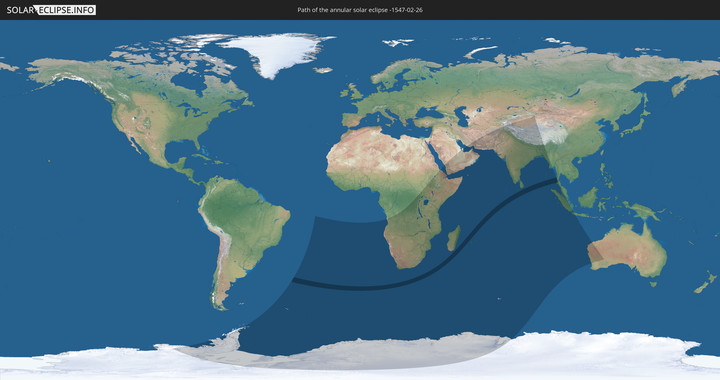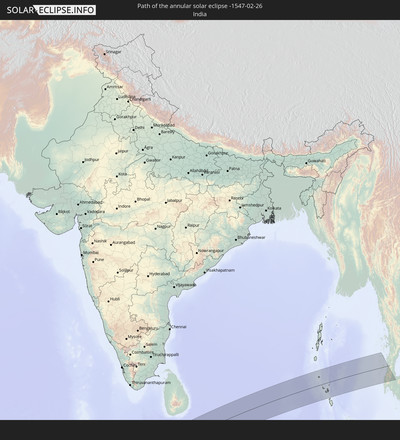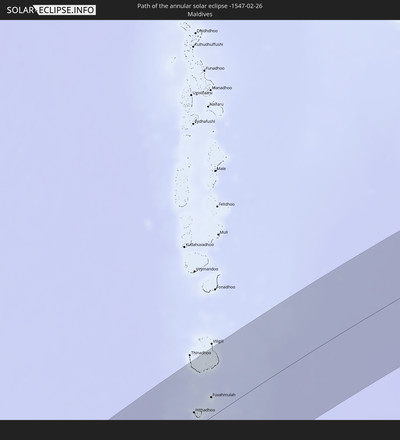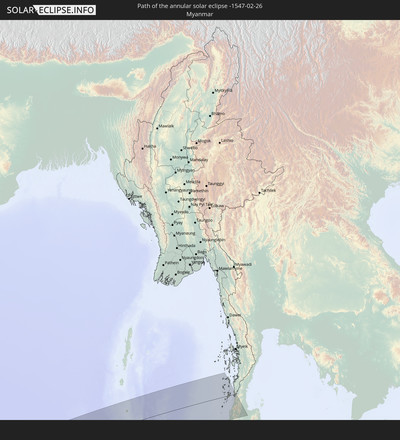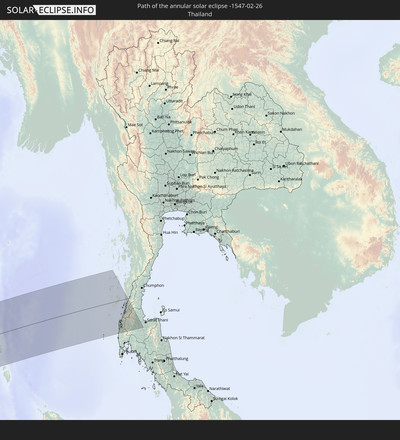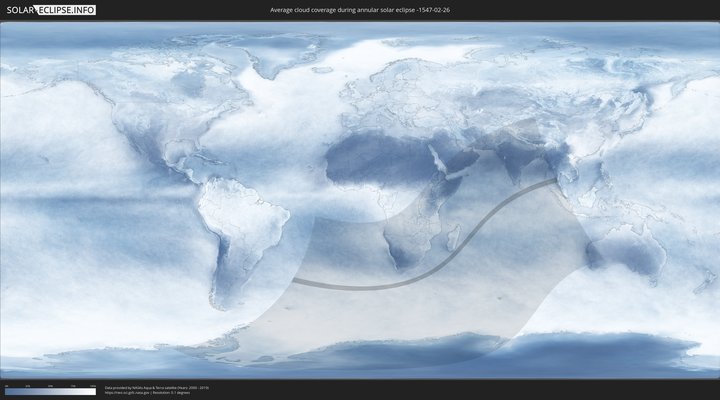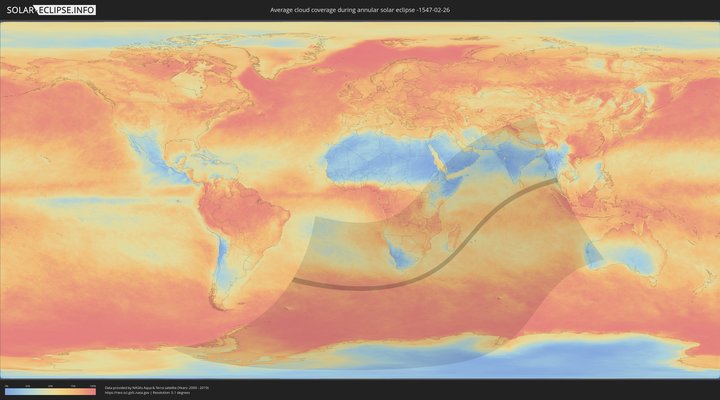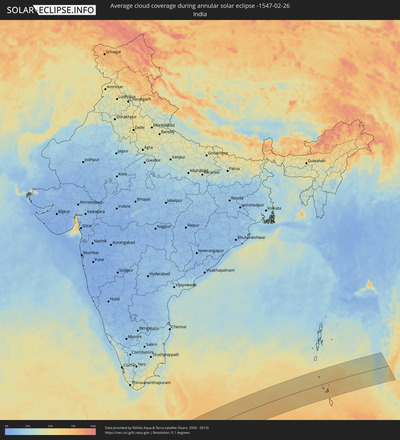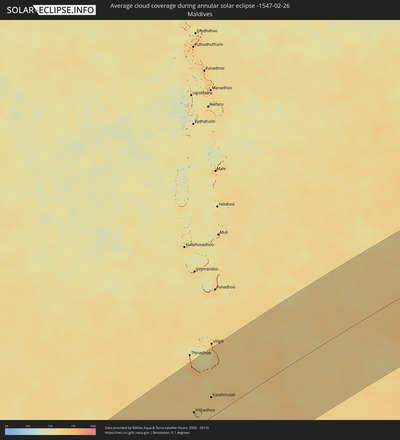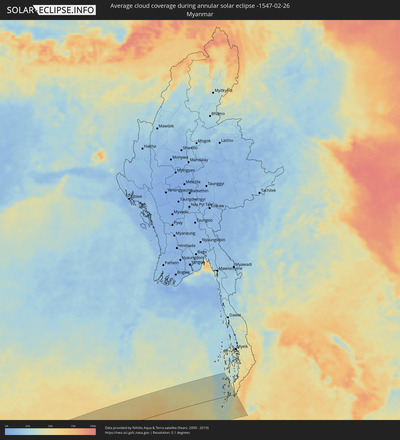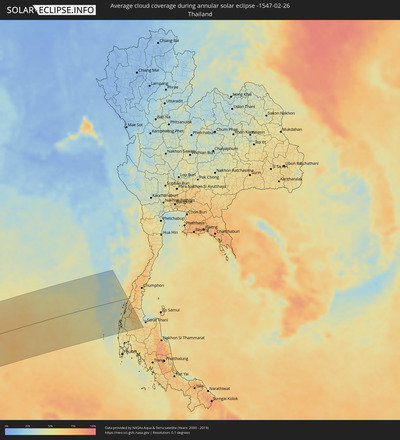Annular solar eclipse of 02/26/-1547
| Day of week: | Monday |
| Maximum duration of eclipse: | 05m49s |
| Maximum width of eclipse path: | 207 km |
| Saros cycle: | 15 |
| Coverage: | 94.6% |
| Magnitude: | 0.9456 |
| Gamma: | -0.2636 |
Wo kann man die Sonnenfinsternis vom 02/26/-1547 sehen?
Die Sonnenfinsternis am 02/26/-1547 kann man in 56 Ländern als partielle Sonnenfinsternis beobachten.
Der Finsternispfad verläuft durch 4 Länder. Nur in diesen Ländern ist sie als annular Sonnenfinsternis zu sehen.
In den folgenden Ländern ist die Sonnenfinsternis annular zu sehen
In den folgenden Ländern ist die Sonnenfinsternis partiell zu sehen
 Antarctica
Antarctica
 South Georgia and the South Sandwich Islands
South Georgia and the South Sandwich Islands
 Saint Helena, Ascension and Tristan da Cunha
Saint Helena, Ascension and Tristan da Cunha
 Bouvet Island
Bouvet Island
 Angola
Angola
 Namibia
Namibia
 Democratic Republic of the Congo
Democratic Republic of the Congo
 South Africa
South Africa
 Botswana
Botswana
 Zambia
Zambia
 Zimbabwe
Zimbabwe
 Lesotho
Lesotho
 Rwanda
Rwanda
 Burundi
Burundi
 Tanzania
Tanzania
 Uganda
Uganda
 Mozambique
Mozambique
 Swaziland
Swaziland
 Malawi
Malawi
 Ethiopia
Ethiopia
 Kenya
Kenya
 Saudi Arabia
Saudi Arabia
 Eritrea
Eritrea
 French Southern and Antarctic Lands
French Southern and Antarctic Lands
 Somalia
Somalia
 Djibouti
Djibouti
 Yemen
Yemen
 Madagascar
Madagascar
 Comoros
Comoros
 Iran
Iran
 Mayotte
Mayotte
 Seychelles
Seychelles
 Qatar
Qatar
 United Arab Emirates
United Arab Emirates
 Oman
Oman
 Réunion
Réunion
 Mauritius
Mauritius
 Afghanistan
Afghanistan
 Pakistan
Pakistan
 Tajikistan
Tajikistan
 India
India
 British Indian Ocean Territory
British Indian Ocean Territory
 Heard Island and McDonald Islands
Heard Island and McDonald Islands
 Maldives
Maldives
 China
China
 Sri Lanka
Sri Lanka
 Nepal
Nepal
 Bangladesh
Bangladesh
 Bhutan
Bhutan
 Myanmar
Myanmar
 Indonesia
Indonesia
 Cocos Islands
Cocos Islands
 Thailand
Thailand
 Malaysia
Malaysia
 Christmas Island
Christmas Island
 Australia
Australia
How will be the weather during the annular solar eclipse on 02/26/-1547?
Where is the best place to see the annular solar eclipse of 02/26/-1547?
The following maps show the average cloud coverage for the day of the annular solar eclipse.
With the help of these maps, it is possible to find the place along the eclipse path, which has the best
chance of a cloudless sky.
Nevertheless, you should consider local circumstances and inform about the weather of your chosen
observation site.
The data is provided by NASAs satellites
AQUA and TERRA.
The cloud maps are averaged over a period of 19 years (2000 - 2019).
Detailed country maps
Cities inside the path of the eclipse
The following table shows all locations with a population of more than 5,000 inside the eclipse path. Cities which have more than 100,000 inhabitants are marked bold. A click at the locations opens a detailed map.
| City | Type | Eclipse duration | Local time of max. eclipse | Distance to central line | Ø Cloud coverage |
 Hithadhoo
Hithadhoo
|
annular | - | 16:10:00 UTC+04:54 | 30 km | 70% |
 Fuvahmulah, Gnyaviyani Atoll
Fuvahmulah, Gnyaviyani Atoll
|
annular | - | 16:10:42 UTC+04:54 | 37 km | 62% |
 Ranong, Ranong
Ranong, Ranong
|
annular | - | 18:16:03 UTC+06:42 | 13 km | 55% |
